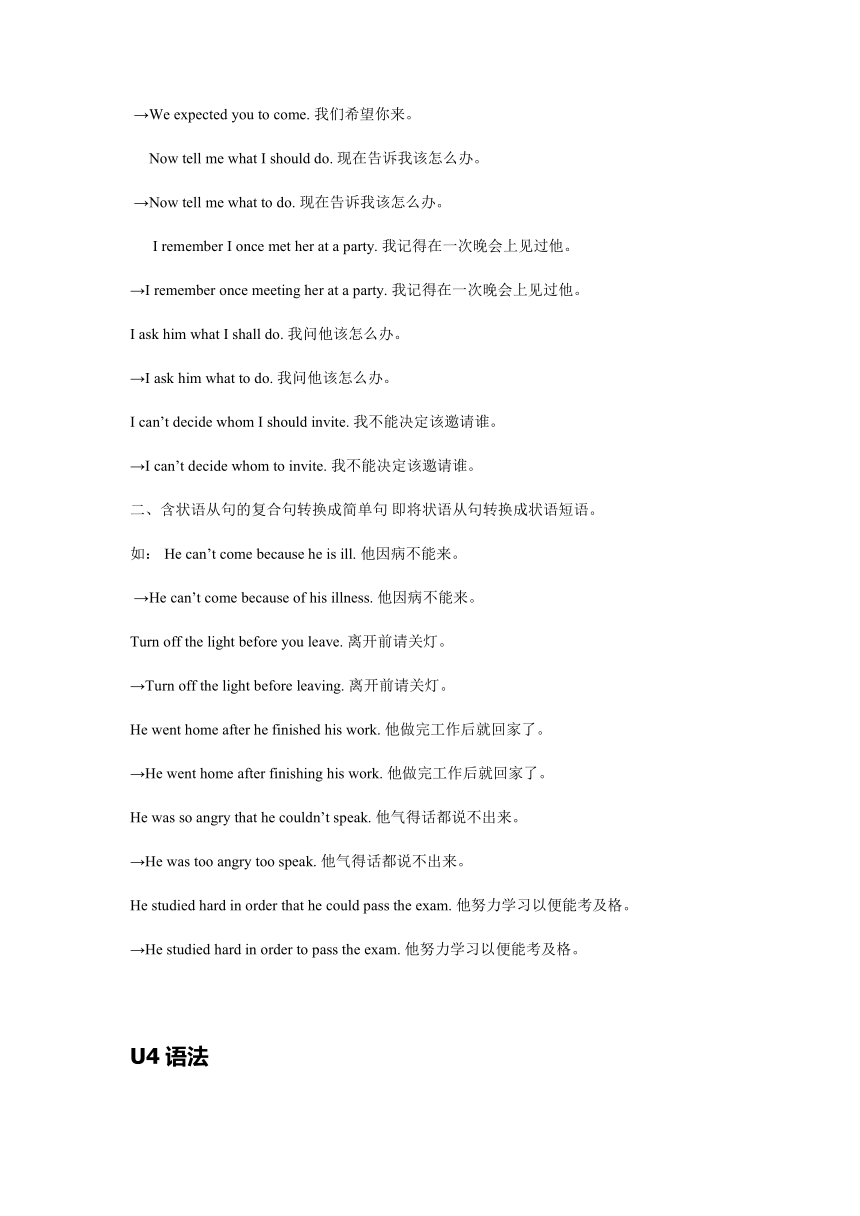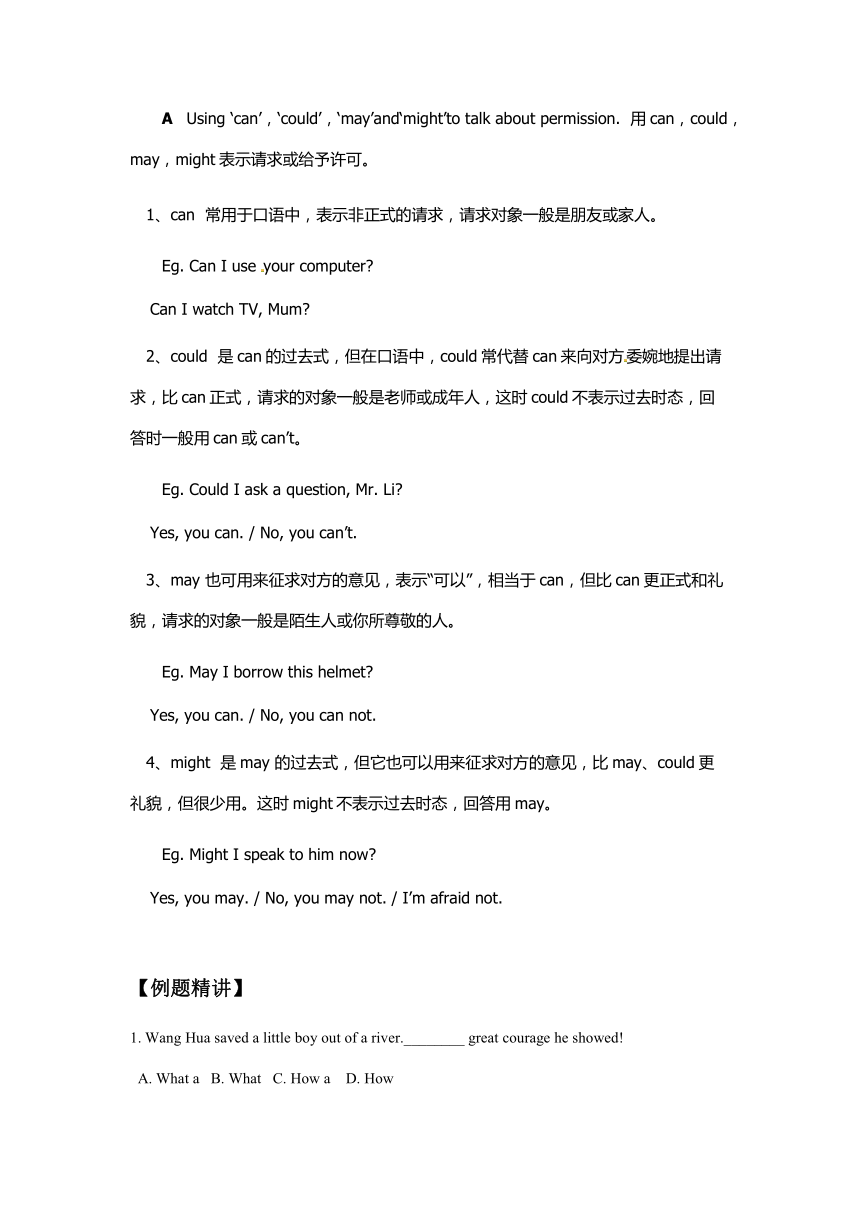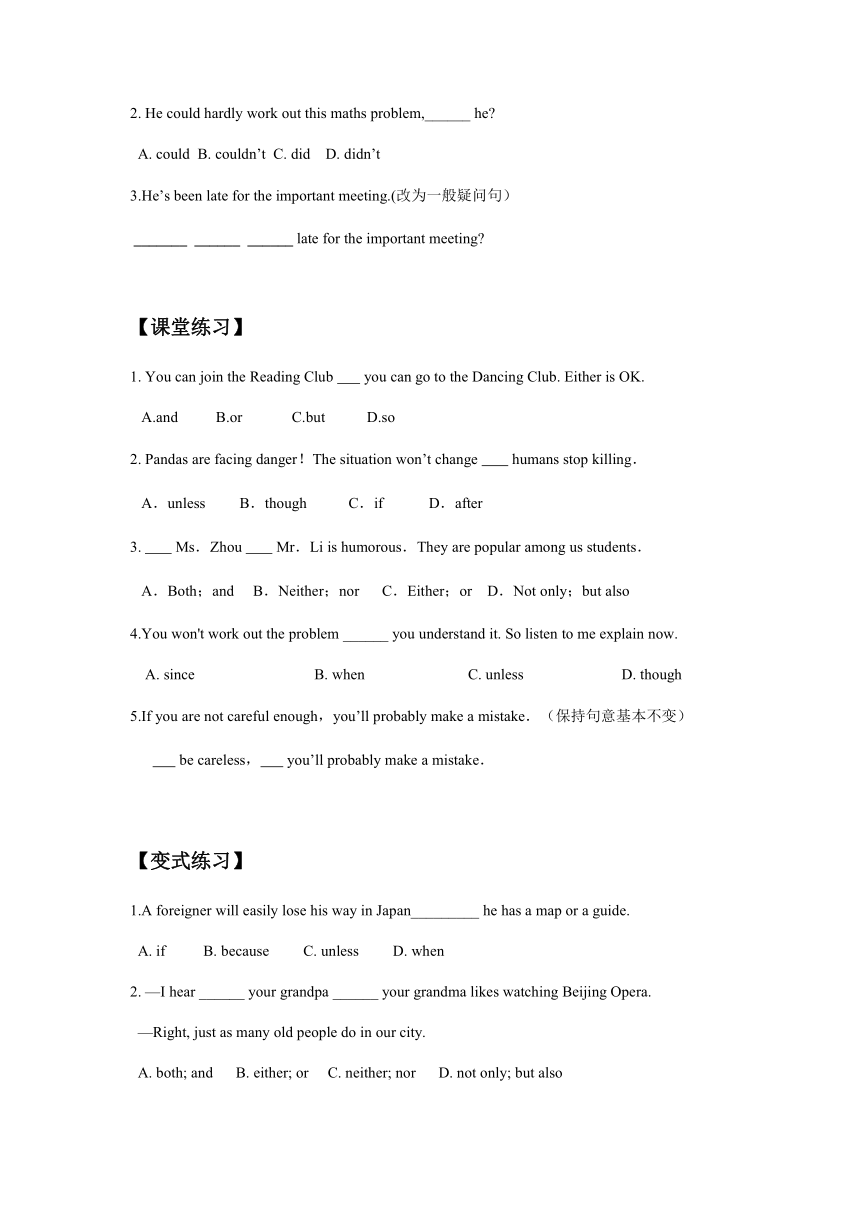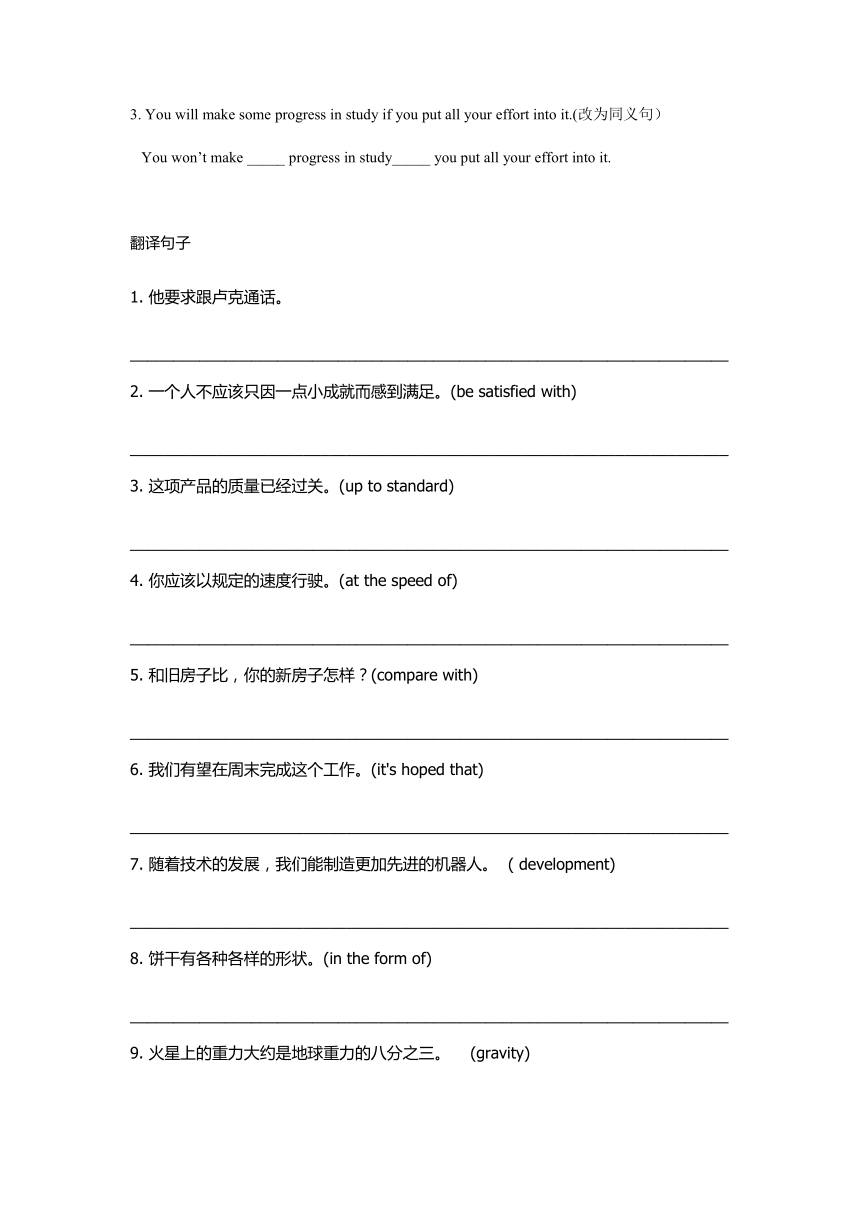牛津译林九年级下册Unit3-Unit4同步语法及阅读练习
文档属性
| 名称 | 牛津译林九年级下册Unit3-Unit4同步语法及阅读练习 |  | |
| 格式 | zip | ||
| 文件大小 | 61.5KB | ||
| 资源类型 | 教案 | ||
| 版本资源 | 牛津译林版 | ||
| 科目 | 英语 | ||
| 更新时间 | 2020-02-08 13:48:28 | ||
图片预览





文档简介
牛津译林九年级下册Unit3-Unit4同步语法及阅读练习
U3语法
简单句和复合句之间的转换
【知识梳理】
1.用宾语从句会宾语+宾补
He saw that the robot was making breakfast.
→He saw the robot making breakfast.
He found his flat was in a complete mess.
→He found his flat in a complete mess.
He thinks that it is too much trouble to own a robot.
→He thinks it too much trouble to own a robot.
2.用宾语从句或疑问词+带to的动词不定式
The robot no longer knew when it should cook breakfast.
→The robot no longer knew when to cook breakfast.
Mr Jiang did not know what he should do with the robot.
→Mr Jiang did not know what to do with the robot.
3. 复合句与简单句的转换技巧 ?
一、含宾语从句的复合句转换为简单句
即将宾语从句转换成相应的短语。
如: We expected that you would come. 我们希望你来。
→We expected you to come. 我们希望你来。
Now tell me what I should do. 现在告诉我该怎么办。
→Now tell me what to do. 现在告诉我该怎么办。
I remember I once met her at a party. 我记得在一次晚会上见过他。
→I remember once meeting her at a party. 我记得在一次晚会上见过他。
I ask him what I shall do. 我问他该怎么办。
→I ask him what to do. 我问他该怎么办。
I can’t decide whom I should invite. 我不能决定该邀请谁。
→I can’t decide whom to invite. 我不能决定该邀请谁。
二、含状语从句的复合句转换成简单句 即将状语从句转换成状语短语。
如: He can’t come because he is ill. 他因病不能来。
→He can’t come because of his illness. 他因病不能来。
Turn off the light before you leave. 离开前请关灯。
→Turn off the light before leaving. 离开前请关灯。
He went home after he finished his work. 他做完工作后就回家了。
→He went home after finishing his work. 他做完工作后就回家了。
He was so angry that he couldn’t speak. 他气得话都说不出来。
→He was too angry too speak. 他气得话都说不出来。
He studied hard in order that he could pass the exam. 他努力学习以便能考及格。
→He studied hard in order to pass the exam. 他努力学习以便能考及格。
U4语法
A Using ‘can’,‘could’,‘may’and‘might’to talk about permission. 用can,could,may,might表示请求或给予许可。
1、can 常用于口语中,表示非正式的请求,请求对象一般是朋友或家人。
Eg. Can I use your computer?
Can I watch TV, Mum?
2、could 是can的过去式,但在口语中,could常代替can来向对方委婉地提出请求,比can正式,请求的对象一般是老师或成年人,这时could不表示过去时态,回答时一般用can或can’t。
Eg. Could I ask a question, Mr. Li?
Yes, you can. / No, you can’t.
3、may 也可用来征求对方的意见,表示“可以”,相当于can,但比can更正式和礼貌,请求的对象一般是陌生人或你所尊敬的人。
Eg. May I borrow this helmet?
Yes, you can. / No, you can not.
4、might 是may 的过去式,但它也可以用来征求对方的意见,比may、could更礼貌,但很少用。这时might不表示过去时态,回答用may。
Eg. Might I speak to him now?
Yes, you may. / No, you may not. / I’m afraid not.
【例题精讲】
1. Wang Hua saved a little boy out of a river.________ great courage he showed!
A. What a B. What C. How a D. How
2. He could hardly work out this maths problem,______ he?
A. could B. couldn’t C. did D. didn’t
3.He’s been late for the important meeting.(改为一般疑问句)
_______ ______ ______ late for the important meeting?
【课堂练习】
1. You can join the Reading Club you can go to the Dancing Club. Either is OK.
A.and B.or C.but D.so
2. Pandas are facing danger!The situation won’t change humans stop killing.
A.unless B.though C.if D.after
3. Ms.Zhou Mr.Li is humorous.They are popular among us students.
A.Both;and B.Neither;nor C.Either;or D.Not only;but also
4.You won't work out the problem ______ you understand it. So listen to me explain now.
A. since B. when C. unless D. though
5.If you are not careful enough,you’ll probably make a mistake.(保持句意基本不变)
be careless, you’ll probably make a mistake.
【变式练习】
1.A foreigner will easily lose his way in Japan_________ he has a map or a guide.
A. if B. because C. unless D. when
2. —I hear ______ your grandpa ______ your grandma likes watching Beijing Opera.
—Right, just as many old people do in our city.
A. both; and B. either; or C. neither; nor D. not only; but also
3. You will make some progress in study if you put all your effort into it.(改为同义句)
You won’t make _____ progress in study_____ you put all your effort into it.
翻译句子
1. 他要求跟卢克通话。
_____________________________________________________________________
2. 一个人不应该只因一点小成就而感到满足。(be satisfied with)
_____________________________________________________________________
3. 这项产品的质量已经过关。(up to standard)
_____________________________________________________________________
4. 你应该以规定的速度行驶。(at the speed of)
_____________________________________________________________________
5. 和旧房子比,你的新房子怎样?(compare with)
_____________________________________________________________________
6. 我们有望在周末完成这个工作。(it's hoped that)
_____________________________________________________________________
7. 随着技术的发展,我们能制造更加先进的机器人。 ( development)
_____________________________________________________________________
8. 饼干有各种各样的形状。(in the form of)
_____________________________________________________________________
9. 火星上的重力大约是地球重力的八分之三。 (gravity)
_____________________________________________________________________
10.住在那里我们可能得病。(get ill from)
_____________________________________________________________________
阅读理解
【知识梳理】
阅读理解体裁种类较多,但是初中阶段常考的阅读理解体裁多为记叙文、说明文和议论文。记叙文体可细分为小说、时文报道、人物传记及轶闻趣事。
记叙文阅读理解解题技巧
1)体裁特点
记叙文是以叙述描写为主要方式,是一种记载和叙述事件由来,描绘事物和人物情景状态、过程及发展的文体。其主要特点为通过生动的事例来反映生活和作者的思想感情。记叙文的表达方式常常结合了说明、议论、描写、抒情,生动形象地讲述发生在过去、现在和未来的事情。常见的记叙文有小说、戏剧、传记、游记、新闻报道、日记、童话、寓言以及记叙性的散文等文体。但无论哪种记叙文,都囊括了事件的时间、地点、人物、事情的起因、经过和结果。记叙的手法分顺叙和倒叙两种。记叙文要么是按时间顺序,要么是按事件的重要性的顺序来展开。不管是哪种叙述方法,最后经常会有一两句话抒发作者的情绪与感悟,这是记叙文的精华所在,也是阅读的难点所在,可谓“一篇之妙,在于落句”。
批注:上述体裁特点,建议任课老师要让学生熟记于心,讲解时把上文描述的体裁特点让学生标记出来,重点理解,并且在学生后续练习时,让学生尝试通过运用记叙文的体裁特点,提高阅读理解答题正确率,以锻炼学生的迁移能力及灵活运用能力。
2)命题特点
从命题形式上看,常见的有细节理解、词义猜测、主旨大意、推理判断、作者意图等题型。除了推论或词义辨识题,记叙文命题的顺序一般都会按照文章的脉络和故事发展的顺序层层推进,否则就会觉得别扭,逻辑不通。同时,记叙文需要事件的发展过程作支撑,一半以上的题目都会用来检测考生对故事的了解,因此,我们必须弄明白整件事情的发展脉络。而其余像主旨大意、作者意图之类的题目,则取决于文章的落句,集中考查对作者所发的感触的理解。总之,细节题是记叙文命题的主流题型。而寓意之类的题则是高一层次的题,有一定的难度和区分度,它们是拉开距离的题,答对了这些题,才有可能成功地跻身高分之列。综上所述,记叙文的应对策略即:不漏细节,奠定基础;把准寓意,方能成功。
批注:命题特点与前文体裁特点相得益彰,建议任课老师从体裁特点与命题特点有机结合的角度,透彻地给学生讲解,让学生准确把握记叙文阅读理解的命题特点,为理解和掌握其答题技巧奠定基础。
3)解题技巧
一把钥匙开一把锁。要解答好记叙文阅读理解题,就应该有一套针对性强的方法和技巧。下面是老师的一点心得体会,希望能对你有所帮助。
1. 细节题,顺藤摸瓜法。
此类考查事实和细节的题目大多数是针对文章的细节设计的,其主要提问方式是:
1) Which of the following is right?
2) Which of the following is not mentioned?
3) Which of the following is Not True in the passage?
4) Choose the right order of this passage.
5) From this passage we know ________.
记叙文中有大量的事件发展过程中的细节,包括记叙文的5W(what, who, when, where, why)要素。因此作答细节题的时候,就没有那么复杂,一般只需要由前到后,从上到下,一题一题地做就可以了。
例1:The worker I hired to repair my house had just finished a difficult first day on the job. A broken wheel made him an hour late; his ladder (梯子) fell down when he was painting the roof and now his old truck wouldn' t start. With each problem he shouted angrily, more at himself than at his things. As I drove him home, the man didn't say a word.
I tried talking to the man to kill time. I managed to find out that he had come up from Blue Hills in Victoria with his family six months ago to find a job. This was his first job since moving here. I now knew why his price was lower than any other worker I could find in the local newspaper. He really needed the job. His clothes told me as much.
On arriving, much to my surprise, he invited me in to meet his family. As we walked through his front garden he suddenly stopped at a small tree and placed his hands on it. Then, when he opened the door he completely changed. Instead of his troubled face, there was now a warm smile, hugs for his two children and a kiss for his wife.
The following day, I asked him about the tree.
"That's my trouble tree," he answered. "Work troubles aren't welcome at home with my wife and the children. So I hang them on that tree every night when I come home. Then in the morning I pick them up again. "
"And you know what else?" he said smiling," The next morning I find that there aren't as many as I remember hanging up the night before. "
46. Which of the following things did NOT happen to the worker?
A. His truck broke down. B. He was late for work.
C. He fell onto the roof. D. His ladder fell down.
例2:Paul and Jason were brothers who lived and worked on neighboring farms.For 35years they farmed side by side,sharing machinery and goods as needed,without a single problem.
However,one autumn,things changed.It began with a tiny disagreement about a horse,which grew into a major difference.The difference led to angry words,followed by weeks of silence between the two brothers.
One morning there was a knock on Paul's door.He opened it and saw a builder holding his toolbox.“I'm looking for a few days’ work,”the builder said.“Are there any jobs here I could help with? ”
“Yes,”answered Paul,extremely pleased to see the builder.“I do have a job for you.Look at that farm across the creek(小溪).That's my brother's farm.That creek used to be a grass field,but last week my brother dug a path from the river and made the creek.But I'll go him one better.See that pile of wood? I want you to build me a fence,two meters tall,so I won't need to see him anymore.”
The builder said thoughtfully,“I think I understand the situation and I'll be able to do a job that pleases you.”
Paul had business in town that day and left the builder to his work.When he returned,the builder had just finished his job.Paul was shocked.Instead of a fence there was a bridge,stretching from one side of the creek to the other.
As Paul stood on the bridge,staring in amazement,his younger brother Jason,came across, and took Paul's hand.“You are a good man to have built this bridge after all I've done,”said Jason.
Then,Paul,with tears in his eyes,said to the builder who was packing h/s bag to go,“Thank you so much.Please stay.I have much more for you to do.”
“I'd love to,”the builder said quietly,“but,I have many more bridges to build.”
50.In what order did the following take place in the story?
a.The brothers stood on the bridge
b.Jason dug the creek.
c.The brothers became angry with each other
d.The builder asked for work
e.Paul went into town
A.b,c,e,d,a B.c,b,d,e,a C.b,e,c,a,d D.c,d,b,a,e
2. 推理判断题,左顾右盼法。
此类题目文章中没有明确的答案,需要考生在理解全文的基础上进行推理和判断。其主要提问方式是:
1) We can guess the writer of the letter may be a ______.
2) We can infer from the text that _______.
3) From the letters we’ve learned that it’s very ___ to know something about American social customs.
4) From the story we can guess ______.
5) What would be happy if …?
在做题过程中,尤其是在记叙文中,我们大都不能在文中找到与题干一字不差的词语或句子。这时我们需要认真研究问题,抓住题干中的关键词语,然后到文中准确地找到与之相关的语句,或是疑似语句的位置,接着去左顾,或右盼,在前句或后句,根据记叙文的体裁特点逐步寻找线索。我们要在文章前后左右查找,在字里行间里去寻觅。有时还还要借助自己的生活经验和常理来体会这言外之意。
例1:Years ago a professor named John Hopkins gave a group of graduate students this task:Go to the slums(贫民窟).Find 200 boys who are between the ages of 12 and 16,and research into their background and environment.Then predict their future.
The students.after checking social statistics(统计),talking to the boys,and compiling(汇编) much data,concluded(推断)that 90 percent of the boys would spend some time in prison.
Twenty-five years later another group of graduate students was given the job of testing the prediction.They went back to the same area.Some of the boys—by then men—were still there,a few had died.some had moved away,but they got in touch with 180 of the original 200.They found that only four of the group had ever been sent to prison.
Why was it that these men,who had lived in a breeding(滋生)place of crime,had such a surprisingly good record? The researchers were continually told:“Well.there was a teacher…”
They searched further.and found that in 75 percent of the cases it was the same woman.The researchers went to this teacher,now living in a home for retired teachers.How had she exerted(发挥)this remarkable influence over that group of children? Could she give them any reason why these boys should have remembered her?
“No.”she said,” I really couldn’t.”And then,thinking back over the years,she said amusingly,more to herself than to her questioners:”I loved those boys.”
65. What conclusion can we draw from the story?
A.Love can work miracles(不可思议的事). B.Like teacher,like pupil.
C.Difficulties lead to success. D.Nothing is difficult to the man who will try.
3. 主旨大意题,刨根问底法。
此类题目的主要提问方式是:
1) What is the main idea of this passage?
2)What does the passage mainly talk about?
3) We can conclude / learn from the passage that ……
4)最佳标题选择类型The best title for this passage is ……
5)作者主旨意图类型What does the writer want to tell us?
6) Which can express the purpose of the writer according to the passage?
如前所述,主旨大意题或推理判断、作者意图题等实际上是同一类型的问题,或者说是可用同种方法解答的题型。在解答此类题目的时候,综观——握要。首先着眼于文章的整体,注意理清记叙文内部的相互关系,从宏观上审视文章,领会文章的主旨内涵。其次还要看文章的作者、写作时间和文后的注释等,特别要浏览一下后面问了哪些问题,从题目的选项中揣测文章的主旨,明确作者的主要写作意图。不可被题干的表象所迷惑,要像打开礼物一样,一层一层地打开;在四个可选项中,一个一个地去证实,去排除。特别是解答推论或暗指类的题目,比如“What can be inferred from …?”或是What does the author imply in…?”之类的题目,由于记叙文的体裁特点,文中所陈述的往往不是答案
例1:William Shakespeare was born in Stratford-upon-Avon in 1564 on April the 23rd. His father was an important man in the town, so Shakespeare had a good upbringing. Shakespeare probably went to school (although no records survive to prove this) but not university. He got married when he was 18 to Anne Hathaway and the couple had 3 children.
Shakespeare wrote 38 plays and 154 sonnets (a sonnet is a kind of poem). He began working in his hometown of Stratford, but by 1592, he began writing in London. He became rich enough to buy a house in the capital and another in Stratford. He wrote sad stories called tragedies(悲剧), like Romeo and Juliet, funny stories or comedies, romantic stories and stories about history, such as Julius Caesar.
Shakespeare died on his birthday in 1616, almost 400 years ago. But why are his works still popular today?
His works looked at common human themes, such as betrayal, murder, lust, power, ambition and love. These themes are as much a part of human nature today as they were all those years ago and are the themes we see in modern soap operas and Hollywood films. Even though his theatre, The Globe, burned down in 1613 it was rebuilt in London in 1997 and you can still see his plays performed there today.
Shakespeare’s influence on the English language can still be felt today. We talk about “fair play”, meaning honest behavior but this phrase was first used by Shakespeare. And it was Shakespeare who came up with the expression of “disappear into thin air”, which we still use it today when we lose something. Besides, Shakespeare’s works have been translated into many languages in the world. And perhaps we’ll still be as fascinated by his works 400 years from now as we’ve been for almost the last 400.
60. What is mainly about in the last paragraph?
A. Shakespeare’ works have been translated into many languages.
B. Shakespeare invented many interesting words and phrases in English.
C. Shakespeare wrote many articles on how to understand English phrases.
D. The influence of Shakespeare’s works on the English language to us.
4. 词义猜测题,拨云见日法。
此类猜测词义的题目要求考生根据上下文确定某一特定的词或短语的准确含义。其主要提问方式是:
1) The word “ ????” in the passage probably means ________.
2) The underlined word “It” in the passage refers to _______.
3) In this story the underlined word “ ????” means ________.
4) Here “it” means________.
每年的中考阅读题中,特别是记叙文的阅读题,都会出现一至两道词义猜测题。而这些词汇往往是你素昧平生的,或者和你有点头之交,在文中却另有新意的,总之,猜的是那些在中考词汇表要求之外的词汇。小小的一个词,一个短语,考核的不是你的语法的熟练程度,也不是你的记忆力,而是你对文章通篇或者一个段落的整体把握和变通能力。这时,你不仅需要“左顾右盼”,还需要在几句话,一个段落,乃至整篇文章的字里行间中快速搜寻,看看前面、后面都发生了些什么;反复琢磨人物、事物,或者人物与事物之间的内在联系,才可能在最后拨开团团迷雾,从四个选项中选出正确答案。
需要经过分析、判断、推理之后才能解答的题。该类题是失分题,往往是出题老师用来拉开学生梯度和层次的题。
【例题精讲】
例1:According to Forbes magazine, Oprah Winfrey is one of the richest women in America. She has worked as a news reporter, movie actress, and author, but she is best known for her popular television talk show, Oprah.
Life has not always been easy for Oprah. When she was young, her parents did not live together and she often moved house. Her family was poor, and Oprah did not have her first pair of shoes until she was six years old. But Oprah was smart, she learned how to read before she started school. And even from her young age, Oprah loved to talk.
After graduating from high school, Oprah got a job as a newsreader at a television station in Baltimore. Oprah was very different from the other reporters. She laughed when she made a mistake, and cried if a story was sad. Her style was not right for news reporting, so she was fired(解雇).
Oprah’s boss at the TV station offered her a job as the co-host of a morning talk show called People Are Talking. She was very popular on that show, and in 1981 Oprah moved to Chicago where she had a larger studio audience who loved her program so much. Five years later, her show Oprah was broadcast(广播) for the first time.
Every day, 14 million people watch Oprah in the USA and 130 other countries. She interviews not only famous people but also ordinary people, who she asks to talk about their personal problems. When a guest’s story moves her, she cries and opens her arms for a hug(拥抱). People throughout the USA and around the world feel close to Oprah because of her emotional(情感的) communication style.
60. What does the underlined word “audience” mean?
A. people who work in the TV station. B. people who are interviewed by Oprah.
C. people who watch or listen to a program. D. people who like music.
